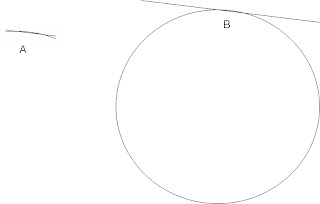
Look at A on the left. At a low resolution, it looks like one fuzzy line. At a higher resolution, it looks like two lines that mostly overlap.
Now, look at B. In B, you can see that the two lines that sort of overlapped in fact were just tangents to one another. If you trace the line long enough, it eventually diverges from the circle for a simple enough reason: the line is straight and it can only overlap with the circle for a certain period of time.
I'd argue that all philosophies start as happy tangencies - a line that seems to overlap with the circle, a philosophy that seems to overlap with reality. But eventually such philosophies show their true nature - products of minds much smaller than the world they're trying to explain, philosophies, hypotheses, and beliefs are all eventually shown to be limited and eventually diverge from reality. This shows up in a variety of circumstances. For instance, the problems at WalMart are in part due to their institutionalizing the solution to a past situation - one that is becoming less relevant.
Reactionaries are worse. They don't just cling to a particular world view. They try to recreate the conditions that seemed to make that worldview correct - stop the world and take it back to the point at which the tangent was happily coincident.
Ultimately, this has to do with a sense of awareness about how much we can actually know the extent to which we need to be open to changes. William James put it this way:
“But the faith that truth exists, and that our minds can find it, may be held in two ways. We may talk of the empiricist way and of the absolutist way of believing in truth. The absolutists in this matter say that we not only can attain to knowing truth but we can know when we have attained to knowing it; while the empiricists think that although we may attain it, we cannot infallibly know when. To know is one thing, and to know for certain that we know is another.” [Louis Menand, Pragmatism: A Reader (New York: Vintage, 1997) 77.]
Some have asked whether there is any hope for Iraq. There is, in the meta-sense. If George would only understand that personal conviction has little to do with actual knowledge and were to express that ... If he were to express a mea culpa that included his denunciation of certitude in the face of complexity, arrogance as an approach, of failing to test the null hypothesis ... That could be one way that this debacle could actually translate into something positive for this country.

1 comment:
have you seen "Why We Fight"?? its an amazing documentary about the congressional-military-industrial complex that started in the Eisenhower administration (not un-common knowledge i know). it goes a long way to explaining this "debacle" and the very deliberate, and purposeful actions of this administration.
Post a Comment